Vols athletics icon Gus Manning remembered as someone filled with all three blessings
By Bill Brewer
The Cathedral of the Most Sacred Heart of Jesus was steeped in orange Feb. 20 for the funeral Mass of longtime University of Tennessee Athletics Department icon Charles A. “Gus” Manning, who died Feb. 12 at the age of 99.
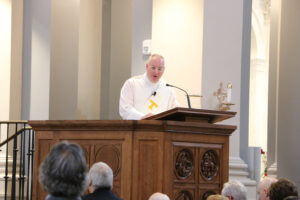
Deacon Patrick Murphy-Racey wears a stole emblazoned with the University of Tennessee Power T to commemorate Mr. Manning while serving at Mr. Manning’s funeral Mass.
Family, friends, co-workers, and admirers filled the cathedral to pay their respects to a Volunteer for Life who was the last remaining direct link in the athletics department to legendary Tennessee football coach Gen. Robert R. Neyland. Many were wearing orange and white.
Mr. Manning played football at Tennessee for Gen. Neyland following World War II, and the young Marine veteran and Knoxville native was then hired by the general as an assistant, which began a career spanning more than 50 years in collegiate athletics for the University of Tennessee.
The University of Tennessee campus is where Mr. Manning lived out his professional and faith lives.
Father Eric Andrews, CSP, was the funeral Mass celebrant. As associate pastor (2000-2003) and then pastor (2003-2009) of St. John XXIII University Parish and Catholic Center on the UT campus, Father Andrews was for nearly 10 years a priest central in Mr. Manning’s faith life. Mr. Manning attended St. John XXIII for decades. Father Andrews now serves in New York City.
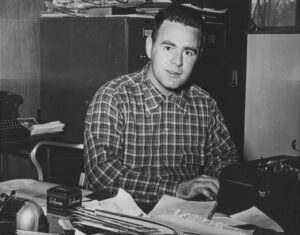
A young Gus Manning serving as sports information director for the University of Tennessee athletics department in the early 1950s. Courtesy of University of Tennessee Archives
Paulist Fathers Don Andrie, pastor of St. John XXIII Parish, and Robert O’Donnell, St. John XXIII associate pastor, concelebrated the Mass. Deacon Patrick Murphy-Racey of St. John XXIII served as deacon of the Word and Eucharist.
To begin his homily, Father Andrews excused his chasuble, his outer vestment, which included a crimson band, alluding to the similarity to University of Alabama team colors. He quickly pointed out that Deacon Murphy-Racey was more appropriately attired. Deacon Murphy-Racey’s dalmatic vestment was white, and his stole included a large, orange Power T that is synonymous with UT sports.
Father Andrews didn’t disappoint some in the congregation who have come to associate his homilies with singing. He launched into “Rocky Top” and led the cathedral in a verse of the rousing Tennessee Vols fight song to set the scene.
It was a fitting segue into his homily on the life and times of Mr. Manning, “our friend, our loved one,” as Father Andrews described him.
The Paulist priest pointed out that much of the liturgy reflected Mr. Manning.
“Welcome to the Cathedral of the Most Sacred Heart of Jesus. It’s a nice cathedral, but it’s no Neyland Stadium, you have to admit,” Father Andrews said smiling. “But Gus wanted us to be here this day because he wanted to make sure there was room for everyone. St. John XXIII on the university campus would have been a little bit cramped, so we’re glad you are here and can spread out. Those of you in the back row can even come closer.”
“But the people in the back row are most like our friend Gus, who would always sit in the very last chair. He was the last one into church and the first one out after receiving the holy Eucharist. There was always something more to be done on the UT campus, even in retirement,” Father Andrews continued. “The Cushman was always waiting, in the fire lane, ready for him to get back to the field to do what needed to be done.”
Father Andrews said he and Deacon Murphy-Racey “called an audible, changed the game plan” and altered the Gospel reading selection at the last minute before Mass.
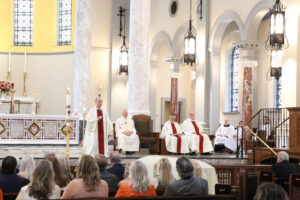
Father Eric Andrews, CSP, leads congregants in a verse of “Rocky Top” during Mr. Manning’s Feb. 22 funeral Mass at the Cathedral of the Most Sacred Heart of Jesus.
“We needed something that was a little more appropriate for our friend, Gus. Enter through the narrow Gate 16 (a reference to the main gate at Neyland Stadium). I picked this Gospel, why? Because it was short. Gus didn’t like things going too long. Point one,” he said.
“Point two, if you were to work at a major football and athletics enterprise for over 50 years, serving 11 head football coaches and eight athletics directors, and you keep your faith to the very end. That is something. That is amazing and not done often,” he added.
Father Andrews repeated the Gospel (Matthew 7:13) he chose for the funeral Mass, “the wide road leads to destruction, but enter through the narrow gate; enter through with faith and hope, always looking to the future, always having Jesus at your side, you will make it to the end, surrounded by friends and loved ones, confident on your last days that you are going to be connected always with everyone. You have entered through the narrow gate. You have competed well. You have finished the race, as St. Paul would say. You have succeeded. And God is planning for you.
“So, we’re here to give thanks to God for Gus Manning, for the many ways he’s touched all of our hearts. He treated the guy sweeping the floor and the guy in the head coach’s office with the same respect and dignity that God has given each one of them. And more importantly, he always kept himself right in line with what was needed and with what God was calling him to do, a very, very narrow line to walk. But he walked it so well. That is why, I think, the gate was given in his honor by Peyton Manning.”
Gate 16 at Neyland Stadium is the main entrance into the stadium. Legendary Vol Peyton Manning, who wore the No. 16 jersey as quarterback for the football team, donated $3.5 million to the Tennessee football program and the Peyton Manning Scholarship Endowment in April 2015. Gate 16 was named the Gus Manning Gate. He served in the UT athletics department for 64 years in positions ranging from sports information director to associate athletics director and special consultant to the athletics director.
Father Andrews described Gus Manning as “the holy spirit of football” who worked backstage to make things happen. “You don’t know where he is or where the Cushman is going, but something is happening.”
Mr. Manning was widely known for riding in his Cushman motorized delivery cart around the UT campus.
Father Andrews remarked that much of the success of UT athletics was built on the shoulders of people like Gen. Neyland and Gus Manning, who were always looking forward, working hard, and demanding excellence.
“So, that gate, which you all enter into with joy, may it always remind you of the type of person that made that happen. One who was always fun and flexible, but who always demanded perfection, who always held people higher, and who was always there to accompany them,” he said, noting that the hardest part will be knowing Mr. Manning won’t be present after 99 years in Knoxville and on the UT campus.
Father Andrews recalled that soon after he arrived on campus, a former football player implored him to remember that on Rocky Top, there is “faith, family, and football.”
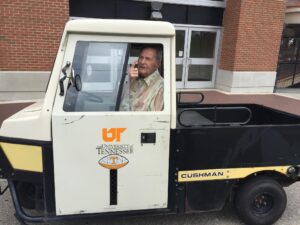
Mr. Manning sits in his Cushman motorized cart that he was widely known for driving to get around the University of Tennessee-Knoxville campus. Courtesy of University of Tennessee Archives
Faith, family, and football are all one, he continued, pointing out that they are all interconnected.
“There’s not a ranking. It’s just the way life is lived,” he said. “Gus saw all of you as his family, as his football family, and all of that wrapped in the faith of Jesus.”
Father Andrews advised the congregation that despite how they revere Mr. Manning, “we cannot afford sainthood on Gus at this moment. It’s just not our way. … It’s a work in progress. But Gus has always been faithful and close to the Lord. And he shared love that the Lord gave him with you so generously. I have a funny feeling he may be very close at that gate if not through it already. And if he does not need our prayers today, I know he will send them back to us in abundance.”
Father Andrews made a point to thank Mr. Manning’s family and friends for remaining close to him during his final years and to the staff at the Nursing Center at Little Creek in West Knoxville, where Mr. Manning stayed.
He then closed his homily by leading the congregation in a verse of “The Tennessee Waltz,” which the UT Pride of the Southland Band plays after every home football game, in memory of Mr. Manning.
“Gus, thank you and bless you. May you lead us through that narrow gate to the eternal banquet, of which we pray you are already enjoying. God bless. And ‘Go Vols,’” Father Andrews concluded.
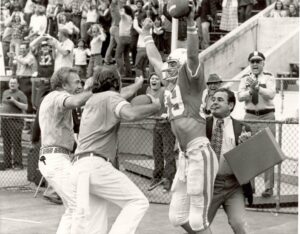
Mr. Manning, holding a briefcase full of money for players’ post-game meals, celebrates as Vols wide receiver Larry Seivers catches the winning touchdown pass against Clemson in 1976. Courtesy of University of Tennessee Archives.
Among those attending the funeral Mass were longtime friends and associates of Mr. Manning, including former Lady Vols athletics director Joan Cronan, former Lady Vols basketball head coach Holly Warlick, legendary Vols quarterback and former assistant athletics director Condredge Holloway, former Vols sports information director Bud Ford, former Tennessee and Minnesota Vikings football standout Tim Irwin, and Pilot Corp. founder Jim Haslam, who attended UT with Mr. Manning and worked with Mr. Manning in athletics department functions.
At the time of his death, Mr. Manning still was listed on the UT Athletics Department directory as “Consultant Athletics Director,” which illustrates how much he is revered.
In remembering Mr. Manning, the UT Athletics Department released a statement that said:
“The impact Gus Manning made on the evolution of Tennessee athletics’ internal operations—much of which was done behind the scenes and away from the spotlight—was no less significant than the contributions of iconic names such as Neyland, Nathan W. Dougherty, Joan Cronan, Doug Dickey, and Pat Summitt.”
The Manning family received an outpouring of sympathy from friends and supporters.
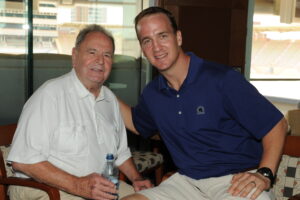
Mr. Manning is pictured with former Tennessee quarterback Peyton Manning. Courtesy of University of Tennessee Archives.
“This is a tremendous loss,” longtime friend and former Tennessee football coach and administrator Phillip Fulmer said. “We’ve lost a major piece of Tennessee history. Gus Manning is an icon. His personality and humor made him a pleasure to be around. And his historical knowledge about all that makes Tennessee athletics special was second-to-none. Our thoughts and prayers are with his family.”
According to his biography, Mr. Manning was “A colorful personality with an unlimited supply of humorous stories, Gus Manning was always a popular after-dinner speaker at civic clubs and sports banquets. A quintessential Volsports fan, Gus attended 608 consecutive football games, stretching from 1951 to 2003. At one time he had a string of 71 years attending home games dating back to the opening game of 1946 until 2017.
“A native of Knoxville, Gus attended Rule High School, where he was voted the best all-around athlete. After serving in the Marine Corps during World War II, Gus entered UT and was a walk-on for the 1947 Tennessee football team and also played baseball for the Vols, earning a letter in 1948. Gus graduated from the University of Tennessee in 1950.
“Hired by Gen. Robert R. Neyland as sports information director in 1951, Gus was employed by the UT athletics department until his retirement in 2000, after which he has continued in a part-time capacity as a consultant to the athletics director. He has served as sports information director, administrative assistant, and senior associate athletics director, with his work covering all aspects of athletics department operations.”
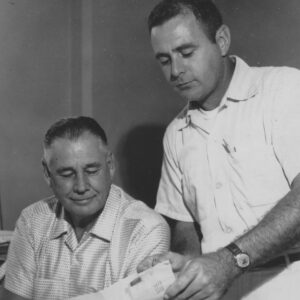
A young Gus Manning is shown with his mentor, former Tennessee football coach Gen. Robert R. Neyland. Courtesy of University of Tennessee Archives.
According to the UT Athletics Department, Mr. Manning was recognized widely for his work, including being inducted into the Tennessee Sports Hall of Fame in 1994, receiving the TSSAA Football Officials’ 50-year award in 2002 and being a member of that organization’s Hall of Fame, and he was selected in the inaugural class of the Tennessee Sports Writers Association Hall of Fame in 2006.
He was named national business manager of the year in 1989 by the College Athletics Business Managers Association as well as serving as president of the Southeastern Conference sports information directors and president of the SEC business managers.
In 1998, he received special recognition from the Knoxville Sports Hall of Fame, and in 2019 he received the Pat Summitt Ignite Greatness Award.
However, according to the athletics department, his crowning moment, among many, was in 2015 when Gate 16 was named for him. The gate is only a few feet away from a statue honoring his mentor, Gen. Neyland.
Mr. Manning may perhaps be best known for his career-long friendship with former UT sports information director Haywood Harris and his broadcasting reports on UT sports. For more than 56 years, Mr. Manning was associated with Knoxville radio station WIVK through his Vol Sports Reports on football and basketball. He also served for 49 years as co-host with Mr. Harris on the WIVK show “The Locker Room,” the longest continuously running radio sports program in the nation.
Mr. Harris died in 2010, and since then “The Locker Room” has continued with Mr. Manning and Mr. Ford. “The Locker Room” completed its 62nd season last fall. Mr. Manning and Mr. Harris also were co-authors of two books: Six Seasons Remembered: The National Championship Years of Tennessee Football, and Once a Vol, Always a Vol.
“No doubt Gus Manning was a true legend not only at Tennessee but also in the Southeastern Conference and national athletic circles. He was a principal figure in the growth of UT athletics as we know it today,” Mr. Ford said.
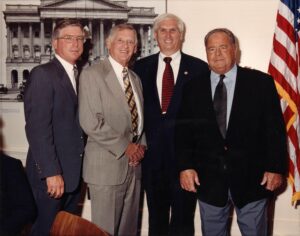
Mr. Manning with, from left, Bud Ford, Haywood Harris, and former Congressman Jimmy Duncan at the White House in 1999. Courtesy of University of Tennessee Archives.
“For me personally, Gus was bigger than life and was responsible for me being hired at the UT Athletics Department. I had the great privilege to witness his ability as an administrator firsthand and spent many hours traveling with him to UT sporting events all across the South,” Mr. Ford added. “His recall of Gen. Neyland, football and basketball games, and stories during his days was amazing. But to Gus, I was affectionately ‘just his paper boy from the neighborhood and not a very good one at that.’ For me, it was a most fortunate title, and I will always be grateful to have had a career opportunity at UT and be mentored by two great men in Gus Manning and Haywood Harris.”
In addition to playing for the Vols when Mr. Manning served in the athletics department, Judge Tim Irwin for years attended St. John XXIII Catholic Center with Mr. Manning.
“I was 17 years old when I first stepped foot on UT’s campus, and Gus Manning was entrenched as the man to see about all things tickets. We went to church together for many, many years at John XXIII. I don’t think he ever missed church. And I know he never missed a UT football game. It’s kind of special to see all of our old buddies here today gathered in a Catholic church to recognize Gus’ life,” said Judge Irwin, who serves as Knox County’s Juvenile Court judge.
“It’s very fitting that all of these old ball players, coaches, and administrative staff that loved him in his job could be here with his church family who loved him in his Church. I would consider Gus a pillar of East Tennessee Catholics,” Judge Irwin added.
Mr. Manning’s survivors include son and daughter-in-law, Sammy Joe and Meg Cifers Manning of Knoxville; grandchildren, Chad (Clare) Manning of Nashville, Joe Manning, and Elizabeth Manning (fiancé Alex Snyder) of Knoxville; great-granddaughter, Elizabeth Rose (Rosie) Manning of Nashville; a brother-in-law, A. J. Bussell, of Oak Ridge; special niece, Kathy Manning; and several other nieces and nephews.
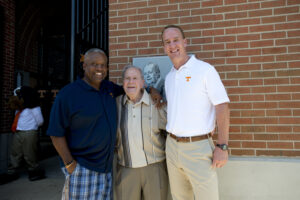
Mr. Manning is pictured with Vols quarterback legends Condredge Holloway and Peyton Manning at Neyland Stadium’s Gate 16, named for Mr. Manning. Courtesy of University of Tennessee Archives.
The Mannings are an Irish Catholic family who settled in Knoxville in the 1800s and began attending Immaculate Conception Church in the 1860s, according to niece Kathy Manning, who is a member of Immaculate Conception.
“Gus lived geographically in Sacred Heart Parish, but he was at home at John XXIII Parish with his university friends,” Ms. Manning explained, noting that Mr. Manning was the youngest of eight children raised in Knoxville’s Mechanicsville community. “That was a very Irish neighborhood within walking distance to Immaculate Conception Church.”
Mr. Manning, born in 1923, went to Knoxville Catholic High School on Magnolia Avenue but was recruited away along with his brother Frank to attend Rule High School in their neighborhood because they were star athletes, his niece said.
Mr. Manning served in the Pacific in the Marines during World War II, and when the war was over, he returned home to attend UT on the GI Bill, she noted. He walked on as a football player, where he was coached by Gen. Neyland, who had been an Army officer also serving in the Pacific.
After Mr. Manning’s playing days, Gen. Neyland hired him to join the UT athletics department. Ms. Manning said one of her uncle’s first jobs was to keep scouts of opposing teams from “spying” on Tennessee football practices.
She described his work through the years at UT as “his dream job.”
“And he lived the dream. How many of us get to say we’ve done that?” she said.

